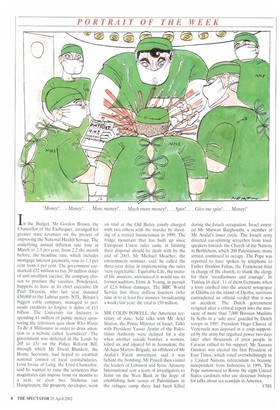I n the Budget, Mr Gordon Brown. the Chancellor of the
Exchequer, arranged for greater state revenues on the pretext of improving the National Health Service. The underlying annual inflation rate rose in March to 2.3 per cent, from 2.2 the month before; the headline rate, which includes mortgage interest payments, rose to 1.3 per cent from 1 per cent. The government earmarked £32 million to buy 30 million doses of anti-smallpox vaccine; the company chosen to produce the vaccines, Powderject, happens to have as its chief executive Dr Paul Drayson, who last year donated £50,000 to the Labour party. NTL, Britain's biggest cable company, managed to persuade creditors to forgive it debts of £11 billion. The University for Industry is spending £1 million of public money sponsoring the television quiz show Who Wants To Be .4 Millionaire in order to draw attention to a website called learndirece. The government was defeated in the Lords by 205 to 131 on the Police Reform Bill, through which Mr David Blunkett, the Home Secretary, had hoped to establish national control of local constabularies. Lord Irvine of Lairg, the Lord Chancellor, said he wanted to raise the sentences that magistrates can impose from six months to a year, or even two. Nicholas van Hoogstraten, the property developer, went
on trial at the Old Bailey jointly charged with two others with the murder by shooting of a retired businessman in 1999. The fridge mountain that has built up since European Union rules came in limiting their disposal should be dealt with by the end of 2003, Mr Michael Meacher, the environment minister, said; he called the three-year delay in implementing the rules 'very regrettable'. Equitable Life, the mutual life assurers, announced it would sue its former auditors, Ernst & Young, in pursuit of £2.6 billion damages. The BBC World Service lost three million listeners (who tune in to at least five minutes' broadcasting a week) last year; the total is 150 million.
MR COLIN POWELL, the American secretary of state, held talks with Mr Ariel Sharon, the Prime Minister of Israel. Talks with President Yasser Arafat of the Palestinian Authority were delayed for a day when another suicide bomber, a woman, killed six and injured 60 in Jerusalem; the Al-Aqsa Martyrs Brigade, an offshoot of Mr Arafat's Fatah movement, said it was behind the bombing. Mr Powell then visited the leaders of Lebanon and Syria. Amnesty International sent a team of investigators to Jenin on the West Bank in the hope of establishing how scores of Palestinians in the refugee camp there had been killed during the Israeli occupation. Israel arrested Mr Marwan Barghouthi, a member of Mr Arafat's inner circle. The Israeli army directed ear-splitting screeches from loudspeakers towards the Church of the Nativity in Bethlehem, which 200 Palestinians, many armed, continued to occupy. The Pope was reported to have spoken by telephone to Father Ibrahim Faltas, the Franciscan friar in charge of the church, to thank the clergy for their 'steadfastness and courage'. In Tunisia 16 died , 11 of them Germans, when a lorry crashed into the ancient synagogue at Ghriba on the island of Djerba; survivors contradicted an official verdict that it was an accident. The Dutch government resigned after a critical report into the massacre of more than 7,000 Bosnian Muslims by Serbs in a 'safe area' guarded by Dutch troops in 1995. President Hugo Chavez of Venezuela was deposed in a coup supported by the army but regained power two days later after thousands of poor people in Caracas rallied to his support. Mr Xanana Gusmao was elected the first President of East Timor, which voted overwhelmingly in a United Nations referendum to become independent from Indonesia in 1999. The Pope summoned to Rome the eight United States cardinals who are diocesan bishops for talks about sex scandals in America.
CSH






































































 Previous page
Previous page